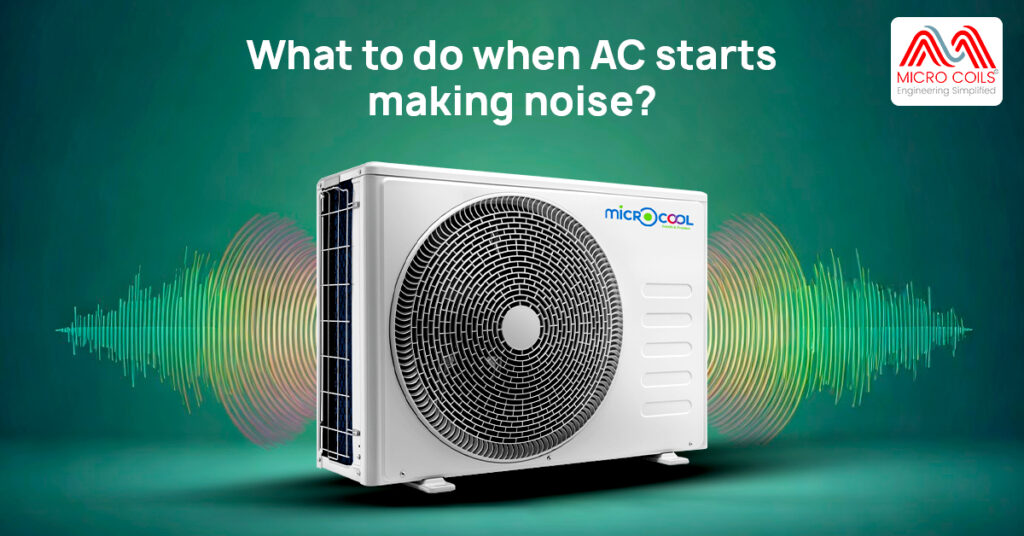
Air conditioning units are designed to run quietly in the background, keeping your home cool and comfortable. However, when your AC making noise becomes noticeable, it’s often a sign that something needs attention. Understanding what these sounds mean and how to address them can save you money, prevent bigger problems, and ensure your cooling system runs efficiently.
What are Normal vs. Problematic AC Sounds?
Before diving into troubleshooting, it’s important to understand that some sounds are completely normal. A gentle humming when the unit starts up, soft whooshing of air through vents, and occasional clicking as the system cycles on and off are all typical operating sounds. However, when these sounds become louder, more frequent, or change in character, they may indicate underlying issues.
Why AC makes noise can vary significantly depending on the type of system you have, its age, and how well it’s been maintained. Indoor units, outdoor units, and ductwork can all produce different sounds for different reasons. The key is learning to distinguish between normal operational sounds and those that signal trouble.
Common Types of AC Noises and Their Meanings
Grinding and Screeching Sounds
When you hear grinding or screeching noises, this often indicates problems with moving parts that need lubrication or replacement. These sounds typically come from worn bearings in the motor or fan assembly. The metal-on-metal contact creates the harsh grinding sound that’s impossible to ignore.
If the sound coming from AC is a high-pitched screech, it might be a belt that’s worn, loose, or misaligned. Older AC units often use belts to drive the fan, and these can stretch or crack over time. While newer systems typically use direct-drive motors, belt-driven systems still exist in many homes.
Banging and Clanking Noises
Loud banging or clanking sounds are often the most concerning because they usually indicate loose or broken components. These sounds can come from various sources, including loose fan blades, disconnected ductwork, or debris that’s gotten into the unit.
When AC fan making noise in this manner, it’s crucial to turn off the system immediately. Continuing to run the unit with loose parts can cause extensive damage to other components and lead to costly repairs.
Buzzing and Humming Sounds
While some humming is normal, excessive or loud buzzing can indicate electrical problems. This might include loose wiring, failing capacitors, or issues with the compressor. Electrical problems in AC systems can be dangerous and should always be addressed by professionals.
A buzzing AC unit sound can also indicate refrigerant issues or problems with the outdoor unit’s electrical components. These sounds often become more pronounced during hot weather when the system works harder.
Whistling and Squealing Noises
High-pitched whistling or squealing sounds often point to airflow restrictions or problems with the blower motor. When air is forced through restricted passages, it creates whistling sounds similar to a tea kettle.
These AC sound problem issues might stem from dirty air filters, blocked vents, or problems with the ductwork. Sometimes, the whistling indicates that the system is working harder than it should to move air, which can increase energy costs and reduce efficiency.
Focusing on Compressor-Related Sounds
The compressor is the heart of your air conditioning system, and AC compressor noise deserves special attention. This component is responsible for circulating refrigerant through the system, and it works under high pressure and temperature conditions.
Normal compressor sounds include a low humming or vibrating noise when the unit starts up and shuts down. However, if you hear loud banging, grinding, or squealing from the outdoor unit where the compressor is located, this could indicate serious problems.
Compressor issues often develop gradually, starting with minor sounds that become progressively louder. Early intervention can sometimes save the compressor, but ignoring these sounds often leads to complete compressor failure, which is one of the most expensive AC repairs.
Step-by-Step Troubleshooting Guide to Impement When AC Starts to Make Noise
Step 1: Safety First
Before investigating any AC noises, always turn off the power to the unit at both the thermostat and the electrical panel. This ensures your safety while examining the system.
Step 2: Check the Obvious Issues
Start with the simplest solutions. Replace your air filter if it’s dirty or clogged. A restricted filter forces the system to work harder and can cause various noises. Check that all vents are open and unobstructed, and remove any debris around the outdoor unit.
Step 3: Inspect the Outdoor Unit
Look for obvious signs of damage, loose parts, or debris inside the unit. Check that the fan blades are intact and properly attached. If you see bent or damaged blades, this could explain the noises you’re hearing.
Step 4: Listen Carefully
Turn the system back on and listen carefully to identify where the sounds are coming from. Are they from the indoor unit, outdoor unit, or ductwork? The location of the sound can help pinpoint the problem.
Step 5: Document the Sounds
Note when the sounds occur. Do they happen when the system starts up, runs continuously, or shuts down? This information will be valuable if you need to call a professional.
When to Call a Professional to Fix AC Noise
While some AC noise issues can be resolved with basic maintenance, many require professional attention. Call a qualified technician if you hear grinding, banging, or electrical buzzing sounds. These often indicate problems that can be dangerous to address without proper training and tools.
Professional diagnosis is especially important for compressor-related noises, electrical issues, or any sounds that seem to be getting worse over time. A qualified technician can identify problems early and prevent minor issues from becoming major expenses.
Preventive Maintenance Tips to Avoid AC Making Noises
Regular maintenance is the best way to prevent most AC noise problems. Change your air filter regularly, typically every 1-3 months depending on usage and air quality. Keep the outdoor unit clean and free from debris, leaves, and vegetation.
Schedule annual professional maintenance to ensure all components are properly lubricated, tightened, and functioning correctly. During these visits, technicians can identify potential problems before they become noisy disruptions.
The Cost of Ignoring AC Noises
Ignoring strange sounds from your AC system almost always leads to more expensive repairs. What might start as a simple bearing replacement can evolve into motor failure if left unaddressed. Similarly, minor electrical issues can damage multiple components if not corrected promptly.
Beyond repair costs, a noisy AC system often indicates reduced efficiency, which means higher energy bills. Systems that work harder to overcome mechanical problems consume more electricity and provide less effective cooling.
Conclusion
When your air conditioner starts making unusual noises, it’s communicating that something needs attention. By understanding what different sounds mean and taking appropriate action, you can maintain a comfortable home environment while avoiding costly repairs.
Remember that while some maintenance tasks can be handled by homeowners, many AC noise issues require professional expertise. Don’t hesitate to call a qualified technician when you’re unsure about the source of the problem or when sounds indicate potentially dangerous conditions.
Regular maintenance, prompt attention to unusual sounds, and professional service when needed will keep your AC system running quietly and efficiently for years to come. Your comfort and your wallet will thank you for taking these noises seriously and addressing them promptly.
Yes, occasional clicking sounds during startup and shutdown are completely normal. These sounds occur when electrical components engage and disengage. However, if clicking becomes rapid, continuous, or accompanied by the unit not starting properly, it may indicate electrical relay problems that require professional attention.
AC units can seem louder at night due to reduced ambient noise levels and cooler temperatures affecting metal components. However, if the actual volume increases significantly, it could indicate temperature-related expansion issues, loose mounting hardware, or the system working harder in cooler nighttime conditions.
No, you should immediately turn off your AC if you hear grinding sounds. Grinding typically indicates metal components rubbing against each other, which can cause severe damage if operation continues. This often signals bearing failure, loose fan blades, or motor problems requiring immediate professional diagnosis and repair.
Absolutely. Dirty or damaged ductwork can create whistling, rattling, or whooshing sounds as air struggles to flow through restricted passages. Loose duct connections, accumulated debris, or damaged insulation can all contribute to unusual noises. Professional duct cleaning and inspection can resolve these airflow-related sound issues.
Repair costs vary widely depending on the issue. Simple fixes like replacing worn belts or lubricating parts may cost less, while major repairs like compressor replacement can cost high. Early diagnosis and regular maintenance help prevent minor noise issues from becoming expensive major repairs.



